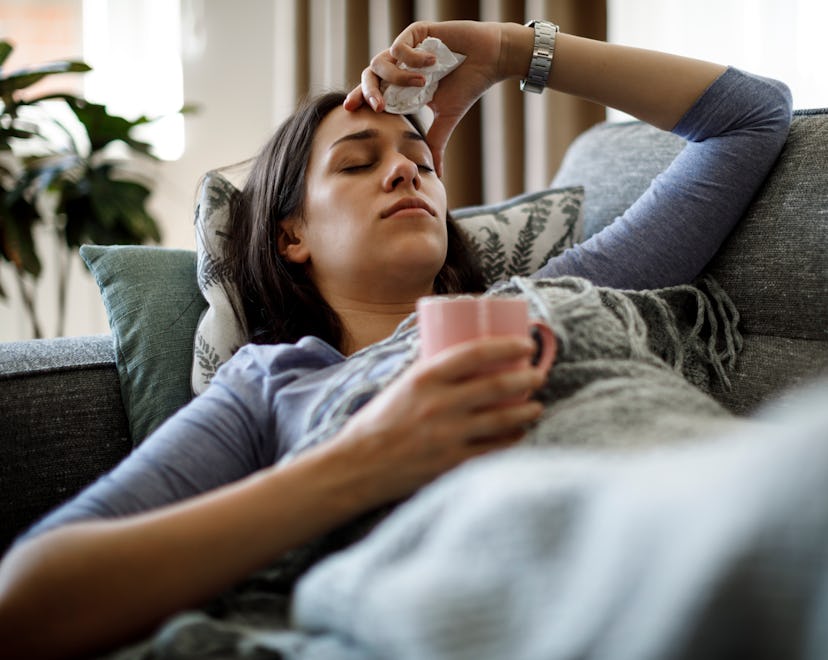Ouch

Why Is Hand, Foot, & Mouth Disease Sometimes Worse For Adults?
It can hit you hard.
Hand, foot, and mouth disease honestly sounds like something from medieval times, but if you have kids in day care or school, it’ll make its way to your house at some point. When it does, you might notice that the kids in your house seem to get through it more easily than the grownups. So, why is hand, foot, and mouth worse for adults sometimes? The reasons may vary, but experts agree that sometimes the grownups fall hardest with this virus. And unlike other common viral illnesses, which can be hard to tell apart, hand, foot, and mouth disease is fairly easy to spot.
Hand, foot, and mouth disease (HFMD) is a viral illness that gets its name from its signature symptom: a red, blistery rash concentrated on the hands and feet and inside the mouth (though it can spread to other areas of the body too). Other signs of HFMD include fever, sore throat, runny nose, and other flu-like symptoms. Some people even lose their nails, which grow back, after a round of catching it. HFMD is caused by the coxsackie virus, which has multiple strains. Just like other viral conditions, kids and adults alike can get HFMD more than once depending on which strain they’re exposed to each time.
HFMD usually clears up in a week to 10 days (so, you know, an eternity when you’re a sick and can’t take a break from being a parent). And, unfortunately for moms and dads everywhere, it could be that you feel worse for longer than your little ones.
Why is hand, foot, and mouth worse for adults?
It could just be that you’ve never had it before. Hand, foot, mouth syndrome is most common in kids (especially those under 5), but its incidence in adults has been increasing over the past 10 years, says Dr. Shalika Katugaha, M.D., system medical director of Infectious Diseases at Baptist Health.
“Really the key there is your own immune system as an adult, because again, it is a virus. So elderly adults and those who are immunocompromised may get it and it may be much worse than it is in childhood,” she says. “In severe disease in adults, in the elderly or immunocompromised, hand, foot, and mouth theoretically can travel to the central nervous system and the heart, causing myocarditis.”
Dr. Christian Blake Bergeron, M.D., pediatrician at Le Bonheur Children’s Hospital, says adults who have severe cases of HFMD may have just never contracted it as kids, so their immune system fighting it off for the first time.
“It’s caused by a virus called coxsackie, and there are several strains of it. If kids are exposed when they’re younger, they mount a response to that and so they’re way less likely to get it as they get older. If an adult gets hand, foot, and mouth, they’ve probably never been exposed to that virus before and their immune system has seen so many other viruses that they react more strongly, and sometimes the symptoms are a little bit more severe,” Bergeron says.
HFMD symptoms may also look a little different in adults than they do in kids, Katugaha explains. “In adults it can cause high fever, the lesions can be in many different locations, and there can be marked skin involvement with different things like ulcers and bullae (large blisters filled with clear fluid), which are a little bit different and may last longer than two weeks.”
Because HFMD is a viral illness, there’s not much doctors can do to treat it. You’ll just have to drink lots of fluids, get plenty of rest, and wait for it to pass.
How not to spread hand, foot, and mouth to your family
While you’re waiting on your case of HFMD to clear up, you’ll definitely want to keep it to yourself. It’s a highly contagious virus, so preventing its spread will require some precautions. Here’s what the experts recommend:
- Wash. Those. Hands. “Specifically when it comes to hand, foot, and mouth, wash your hands after you change diapers, after you use the toilet, and after you blow your nose, cough, or sneeze,” says Katugaha.
- Try not to touch your face and then other household items. “That's still probably the number one weapon we have against fighting off any infection. Avoid putting your hands in your mouth, wiping your nose, wiping your eyes, and wash your hands frequently,” says Bergeron. “Even if you have the little lesions on your hands, you can still do hand washing or even some of the alcohol sanitizers, and most of the time it’s not painful.”
- If one of your children has HFMD, consider quarantining them. “If your child has it, anytime they sneeze, anytime they drool, anything that their hands get on could be contaminated. If you can try to keep them in a certain spot in your house where they can play but not spread it to the whole house, that may help a little bit,” Bergeron says.
- Disinfect surfaces and items after you touch them.
- Stay home from work and school. “Adults should not go to work with hand, foot, and mouth because you’re still contagious, especially within the first few days. Then you should likewise stay home from school and social events. Avoid people who are elderly, immunocompromised, or pregnant. If you’re pregnant and you get hand, foot, and mouth, then there are risks to the baby,” says Katugaha.
So, if you’ve had HFMD and took it way harder than your kids did, you probably weren’t imagining it. You may have just never had the virus when you were little yourself.
Experts:
Dr. Shalika Katugaha, M.D., system medical director of Infectious Diseases at Baptist Health
Dr. Christian Blake Bergeron, M.D., pediatrician at Le Bonheur Children’s Hospital and assistant professor at the University of Tennessee Health Science Center